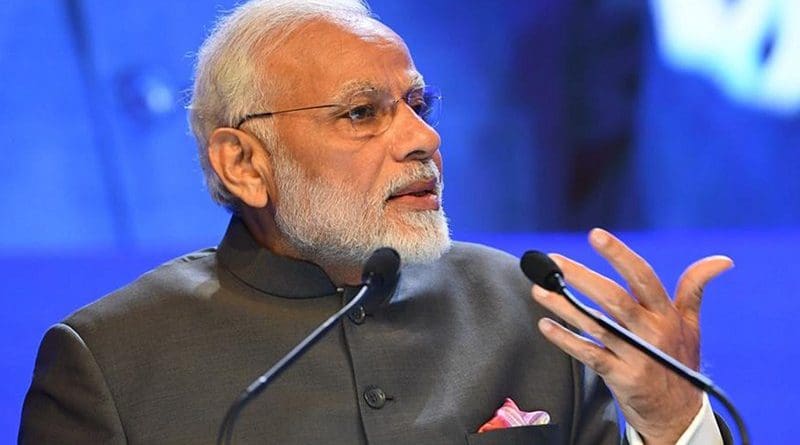Modi Has No Reasons For Regret Before India’s 2019 Parliamentary Election – OpEd
With 2019 parliamentary election in India hardly three months away and Prime Minister Modi having successfully completed nearly 5 years of governance, he has no reason for regret. Careful analysis of Modi’s governance clearly highlight the fact that every step he has taken with courage of conviction and malice towards none. Some of his initiatives may not have yielded the type of success that was expected and other initiatives may have exceeded the expectations. The ground reality is that overall performance is more than satisfactory.
Modi has launched combination of initiatives in socio-economic spheres. What is conspicuous is that he has tried to boost the expectations and confidence of the people and took valiant efforts to build pride amongst the Indians about the traditional and historical value system in India and has taken steps for eradicating several shortfalls in social life of individuals, particularly the poor and downtrodden.
What is very vital is to take a holistic view of five years of governance instead of seeing several steps in isolated manner. Every action of Mr. Modi has resulted in positive impact in several aspects of life and this has to be clearly seen, understood and appreciated. While industrial and economic growth are vital aspects of governance, such growth has to be accompanied by growth in life style and living conditions of the people belonging to lower income group. This is precisely what Mr. Modi has strived hard to achieve.
Mr. Modi inherited a government five years back that was steeped in corruption, with people losing faith as to whether fair and corruption free government could be possible at all in India. Mr. Modi conclusively proved that it would be possible, as he ensured a corruption free central government at the decision making level. Of course, corruption has not been wiped out in India adequately so far particularly at the level of state governments and lower level of administration but Mr. Modi has given hope hat corruption free governance is possible and fighting against corruption is a long drawn process and it would be possible to succeed.
Mr. Modi’s campaign for clean India, efforts to spread yoga movement , construction of thousands of free toilets for poor house holds , opening of bank account for millions of poor people are measures of far reaching significance, which can not be reversed by any government in future. Such measures have enabled people to look and hope for better quality of life, boosting their personal pride and expectations.While corruption in India has grown to gigantic proportions in the last several years before Mr. Modi took over and it called for very harsh steps to defeat the demon of corruption, demonetisation, anti-binami act, promotion of digitalization are great strategies to fight the corruption at the fundamental level.
The banking system in India has undergone severe jolt before Mr,. Modi took over. The insolvency and bankruptcy act is a very important strategy to stabilize the banking operations and eliminate bad debt. Positive results are already being seen.
With his level of confidence in India’s future and pride, Mr. Modi has elevated the status of India in the international relations to new height and perhaps, even much more than what Jawaharlal Nehru could achieve in his time.
Due to historical reasons, India has difficult relations with China and Pakistan. Mr. Modi is managing the relationship with neighbouring countries tactfully to ensure military conflicts would not escalate that would cause set back in economic growth of the country.
There are of course, persisting problems of unemployment due to steady growth in population, distress in farming operations, communal clashes etc. which are due to basic and fundamental historical issues. No government can solve such issues in quick time and strategic approach is needed with short term and long term perseverance and planned strategies, which is what Mr. Modi is adopting. Mr. Modi’s make in India campaign, skill development programme for youth are all part of such strategies.
Apart from several positive and proactive measures which have been well discussed in the media, there have been number of other significant measures which have not received adequate attention. For example, today there are 499 government and private medical colleges offering more than 70,000 seats in India. About 24% of these colleges have come up after 2013-14 when Mr. Modi assumed office as Prime Minister of India. Solar power generation capacity in India was just around 1500 MW before Mr. Modi took over. In the last five years , the solar power generation capacity has now increased to 25000 MW. Wind power capacity has now reached around 35000 MW in 2018. So many other similar examples of proactive growth could be readily pointed out.
The forthcoming 2019 parliament election will be between Mr. Modi and several opposition leaders , though none of the opposition leader matches Mr. Modi in charisma and commitment, individually or collectively. Even in Bharatiya Janata Party, the gap between the stature of Mr. Modi and other leaders is very conspicuous.
The governance of Mr. Modi during the last five years is of Mr. Modi and by Mr. Modi and therefore, Mr.Modi has to adopt a strong campaign to carry forward his message to the people. His achievements have to be told effectively and positively in a convincing way , which Mr. Modi alone can do. He has to address as many meetings as possible, clearly realizing that India needs his leadership and continuation of the standards of governance that he has shown to be possible.

